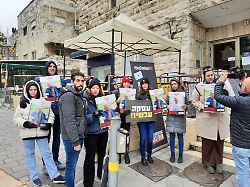Israel’s government is not only under pressure from outside to agree to a ceasefire with Hamas. In their own country, family members of the hostages taken on October 7th are also demonstrating for their relatives to finally be released – with growing despair now even in front of the Prime Minister’s house.
There is an icy wind blowing this morning by Jerusalem standards, and thanks to a light drizzle the air feels a little colder. “My fingers are starting to turn blue,” says Efrat Machikawa, “but it’s even colder in the tunnels in Gaza!” Somewhere in the Gaza Strip, probably in one of the many tunnels dug by the Palestinian Hamas, her uncle Gadi Moses has been held for 109 days since he was kidnapped in the terrorist attack on Israel on October 7th. Despite the cold and rain, Machikawa, together with Moses’ son and his granddaughter, have been demonstrating in Jerusalem’s Rehavia district since the early hours of the morning, in front of Prime Minister Benjamin Netanyahu’s residence. That is, as close as the family and relatives of other Hamas hostages come to the house, which has been cordoned off by the police.
For 109 days, Machikawa, her entire family and the relatives of the more than 200 people abducted by Hamas and other terrorist organizations, of whom more than 130 are still held hostage, have been lobbying the Israeli government to make the rescue of the hostages a top priority . “In the beginning, the understanding expressed by politicians and the empathy they showed were comforting,” says Machikawa. “But words are no longer enough. Time is running out for those kidnapped.” This applies not only to her almost 80-year-old uncle, but to all hostages. Some have already been killed. The last sign of life from Gadi was a video from the terrorist organization Islamic Jihad in December.
Netanyahu and other members of the government have made it clear again and again in the past few days: their priority is to defeat Hamas militarily as completely as possible. An employee of the head of government who confronts the demonstrators on the street also maintains that, despite all compassion, Israel cannot and should not stop the war now. If Israel agrees to a pause in fighting, even a temporary one, the military may no longer be able to resume it due to growing international pressure. The destruction of the terrorist infrastructure in the Gaza Strip would then remain incomplete and Israel would remain in permanent danger.
“The priority must be to save lives”
Regarding the fate of those abducted, the relatives keep hearing the same statement from officials: the government is “doing everything it can to bring the hostages home.” But Gadi Moses’ family is convinced that the goal of defeating Hamas and bringing the hostages home cannot be pursued at the same time. “The priority must be to save lives,” says Machikawa. “You can’t put anything above life itself.” The fact that her uncle and more than 100 Israeli civilians are still held hostage after almost four months shows that the government’s strategy has failed.
The longer their loved ones are held hostage, the more desperate their families become. Just a few days after October 7th, the families set up a protest camp in Tel Aviv. To this day, they continue to draw attention to the fate of terror victims through exhibitions, concerts and demonstrations. “But that doesn’t seem to get through to Bibi,” says Machikawa. Which is why they have been demonstrating in Jerusalem directly in front of Netanyahu’s house since yesterday. They have set up a small camp on the sidewalk opposite the police barriers. Family members of other hostages even stormed a Knesset hearing to confront members of the ruling coalition.
Does she think her message is more likely to get through to the top of the government here? She doesn’t know that, says Machikawa. She couldn’t help but continue to demonstrate until her uncle was free. A glimmer of hope could be a US media report that the Israeli government is considering a ceasefire of up to two months in confidential negotiations in return for the release of the hostages. But Gadi Moses’ family remains skeptical: “We’ll only believe that when we see Gadi again,” say his son and daughter-in-law, who joined the conversation, and Machikawa in unison.
